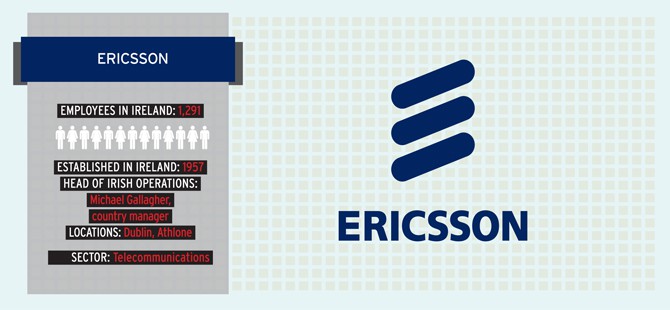The Swedish giant is still one of the most vital telecoms companies in the world – and Ireland is the hub for its global 4G tests and trials.
In an odd way, Ericsson’s continued influence on the world of telecommunications mirrors its influence and impact on the FDI sector in Ireland. The Swedish technology giant is one of the oldest and still most vital telecommunications companies in the world, something evidenced by the 40% of the world’s mobile traffic that passes through Ericsson networks.
In Ireland, Ericsson has been ahead of the pack in utilising Ireland in its development, having had a presence here since 1957. It currently employs around 1,300 employees across two units; telecom and network services in Dublin and research and software development in Athlone.
The Ericsson R&D Centre in Athlone employs almost 1,000 software and systems engineers, providing operations support systems for network management to telecom network operators using advanced mediation, data management and visualisation techniques. The Ericsson site in Athlone has global responsibility for end-to-end design, development, release and support of these applications.
The R&D centre in Athlone has endured mixed fortunes in recent years with an announcement of 100 jobs created in the middle of last year tempered by the loss of a similar number of jobs last month.
The jobs to be lost were described by the company as mainly ‘legacy’ products, or older technology, whereas the new jobs announced were at the opposite end of the spectrum and were said to be focused on the development of emerging technologies, including intelligent network management and IP-TV and smartphone apps.
Perhaps the most pressing area in the development for data communication is the transition from third to fourth generation broadband, or 3G to 4G.
Ericsson’s managing director in Ireland, Michael Gallagher, for example has said the company was aiming to sustain its position in mobile broadband, citing the industry push to improve the quality and diversity of mobile broadband services such as IP-TV and smartphone applications.
LTE (long-term evolution) is the global standard for the fourth generation of mobile broadband (4G), supported by all major players in the industry. It is the fastest-developing system in the history of mobile communication.
Ericsson Ireland has been supporting these tests and trials as part of a global Ericsson programme for LTE. A key element in Ericsson choosing Ireland for these tests was the competence and the support of ComReg in providing temporary licences to Ericsson’s Test Network in Dublin.
There has been significant debate in recent years about whether there is the requisite skills base in Ireland to sustain a significant push to capitalise on the growth of the cloud technology sector and the information, communications technology in general. Much of the solutions offered have focused on providing conversion courses or masters programmes for existing graduates and an important engagement with the industry. Ericsson has taken such an approach and has worked with ICT Ireland, the Ibec group that represents the high-tech sector, to deliver an Applied Software Technology (MAST) programme at DIT and AIT. In an article for a previous edition of Business & Finance, Michael Gallagher outlined how the engagement between industry and third-level institutions works in practice.
“An Ericsson team worked with ICT Ireland and with the Skillnets Training Networks Programme (funded by the National Training Fund of the Department of Education and Skills). The aim of this working group was to sketch the outline for a programme that would take unemployed graduates with an honours level qualification in a cognate discipline, and bring them to a ‘work-ready’ state with respect to the knowledge and skills required of a software engineer in Ericsson.
“Work began in earnest to define the learning objectives, module structure and detailed content of what emerged as an intensive and immersive one-year programme leading to an MSc in Applied Software Technologies.”
The masters programme has just completed its first year and guarantees employment with LM Ericsson for two years on its successful completion. Forty people have recently completed the programme and 100 are starting for the year 2012/2013.

